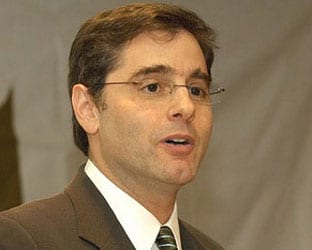 FCC Chairman Julius Genachowski said that the deal between Verizon and a consortium of cable companies for spectrum posed problems, but said certain commitments put the acquisition within the realm of the public interest. Some beg to differ.
FCC Chairman Julius Genachowski said that the deal between Verizon and a consortium of cable companies for spectrum posed problems, but said certain commitments put the acquisition within the realm of the public interest. Some beg to differ.
The sale of spectrum to competitor T-Mobile and promises to accelerate build-out of the spectrum as well as build-out of its FiOS MVPD system were among the things cited by Genachowski as he signaled his support. He said he has circulated a draft order to that effect to the other FCC commissioners.
Ed Markey stated that one condition, making it more difficult for Verizon and the cable companies to enter into mutual marketing agreements, was a key improvement. Nevertheless, he called for rigorous oversight once the deal goes through if it clears all hurdles in the end.
Markey may have been at least partially satisfied, but the Communications Workers of America was not at all. It still vigorously opposes the deal and said that the primary results would be “job cuts, higher prices, and fewer choices.”
Genachowski said:
A rigorous review by the Federal Communications Commission and Department of Justice staffs revealed that the deal as proposed by Verizon Wireless and the cable company owners of SpectrumCo posed serious concerns, including in the wired and wireless broadband and video marketplaces. In response to the agencies’ objections, the parties have made a number of binding pro-competitive commitments and will also make fundamental changes to their agreements. Because of these substantial undertakings and in light of the Consent Decree the companies executed with the Justice Department today, I believe the Commission should now approve this transaction, and I will be circulating a draft order to my colleagues that would do so.
Specifically, Verizon Wireless has undertaken an unprecedented divestiture of spectrum to one of its competitors, T-Mobile, and has committed to accelerate the build-out of its new spectrum and enhance its roaming obligations. In addition, the companies’ commercial agreements will be modified to, among other things, preserve Verizon’s incentives to build out FiOS, increase wireless competition, and ensure that the proposed IP venture is pro-consumer and that its products cannot be used in anti-competitive ways.
Approval of the substantially modified transaction will promote the public interest and benefit consumers in several ways. By advancing U.S. leadership in 4G LTE deployment, the transaction marks another step in our effort to promote the U.S. innovation economy and make state-of-the-art broadband available to more people in more places. The transaction will preserve incentives for deployment and spur innovation while guarding against anti-competitive conduct. And vitally, it will put approximately 20 megahertz of prime spectrum—spectrum that has gone unused for too long—quickly to work across the country, benefiting consumers and the marketplace.
I look forward to working with my colleagues toward a final Commission vote in the near future.
Markey stated:
As an author of the Telecommunications Act of 1996, I expressed concerns about the impact of this transaction on competition and consumer choice. While I remain focused on how this deal will affect these vital touchstones of the telecommunications marketplace, the FCC and the Justice Department have identified and mandated several key changes to significant issues that should help address harms to competition and consumers arising from the deal.
Specifically, elements of the marketing agreements have been blocked that would have reduced the incentive for the companies to compete in areas where Verizon’s FiOS services go head-to-head with the cable companies’ video and broadband products. Limitations on the scope and duration of the joint marketing agreements also are an important improvement. The spectrum transfer from Verizon to T-Mobile will expand choice for consumers looking for an alternative to the larger carriers.
As with any significant change to the communications landscape, vigorous oversight of implementation is essential to ensure that consumers benefit, competition is promoted and innovation is ignited to the benefit of our economy and job creation. I look forward to continuing to work on oversight activities in this area that is central to the economic future of our country.
Here is the CWA statement:
The U.S. Justice Department’s decision today to approve the Verizon Wireless-Big Cable deal is exactly the wrong one for workers, consumers, and communities. The result is a massive Verizon Wireless/cable/content monopoly, job cuts, higher prices, and fewer choices.
The weak conditions on cross-marketing that DOJ has set in place will do little to continue competition. Instead, this deal will result in Verizon abandoning further investment in FiOS, its high speed network. For communities like Baltimore, Boston, Buffalo, cities across upstate New York and most of Pennsylvania, Maryland, Massachusetts, Delaware, and Virginia, there will be no high-speed Internet competition—none.
The cable monopoly with high-speed linked to content bundles that drive average prices higher is not the answer. No other 21st Century nation has chosen this path. Finally, how will the DOJ or FCC police marketing restrictions within a market area?
Not only have regulators lost their focus on competition, but they again show that jobs get no consideration in telecommunications policy. Without incentives or direction for Verizon to continue to build out FiOS, thousands of good paying jobs will be lost.





